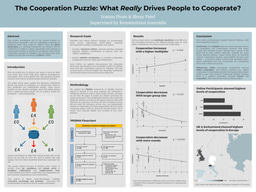The Cooperation Puzzle: What really drives people to Cooperate?
This report presents my summer research project, co-authored with Ivanna. We investigate cooperation in public goods games through a meta-analysis of 20 studies, unveiling the secret factors that affect cooperation and exploring the broader implications for human behaviour.
The public goods game models a central puzzle in behavioural economics: why do people cooperate when free-riding maximises individual payoffs? In the game, participants choose how much to contribute to a shared pool, which is multiplied and redistributed equally. Despite predictions of universal free-riding, substantial cooperation is routinely observed. To explain this paradox, we conducted a meta-analysis of 20 experimental studies (2003–2025), extending Zelmer’s (2003) earlier work. Using the PRISMA framework, we identified key design features, such as communication, punishment, framing, and experience, and assessed how they shape contribution rates, offering updated insights into the drivers of collective action.

Please sign in
If you are a registered user on Laidlaw Scholars Network, please sign in
Excellent write up Shrey! Was a pleasure working with you